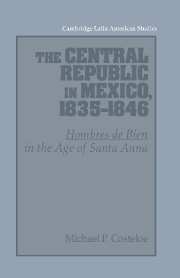Book contents
- Frontmatter
- Contents
- Preface
- Acknowledgements
- 1 An introduction: change and continuity in the Age of Santa Anna
- 2 The end of federalism
- 3 The transition to centralism: stage I
- 4 The transition to centralism: stage II
- 5 Las Siete Leyes
- 6 Anastasio Bustamante and the centralist republic, 1837–1839
- 7 Santa Anna versus Bustamante: the end of the Siete Leyes, 1839–1841
- 8 ‘La dictadura disfrazada con el hermoso nombre de regeneración política’
- 9 Santa Anna and the Bases Orgánicas
- 10 ‘La revolución de tres horas’
- 11 Herrera and the rise of Paredes y Arrillaga
- 12 Hombres de bien and the restoration of federalism
- 13 Conclusion
- Sources and works cited
- Index
- CAMBRIDGE LATIN AMERICAN STUDIES
10 - ‘La revolución de tres horas’
Published online by Cambridge University Press: 23 October 2009
- Frontmatter
- Contents
- Preface
- Acknowledgements
- 1 An introduction: change and continuity in the Age of Santa Anna
- 2 The end of federalism
- 3 The transition to centralism: stage I
- 4 The transition to centralism: stage II
- 5 Las Siete Leyes
- 6 Anastasio Bustamante and the centralist republic, 1837–1839
- 7 Santa Anna versus Bustamante: the end of the Siete Leyes, 1839–1841
- 8 ‘La dictadura disfrazada con el hermoso nombre de regeneración política’
- 9 Santa Anna and the Bases Orgánicas
- 10 ‘La revolución de tres horas’
- 11 Herrera and the rise of Paredes y Arrillaga
- 12 Hombres de bien and the restoration of federalism
- 13 Conclusion
- Sources and works cited
- Index
- CAMBRIDGE LATIN AMERICAN STUDIES
Summary
The national Congress is one of the unsung heroes of the Age of Santa Anna. From the time of Iturbide onwards, successive generations of congressmen displayed considerable courage in their determination to sustain the independence of the legislative power, often in the face of open hostility from the military-dominated executives. Iturbide's response was to jail recalcitrant deputies and to use his military strength to close the Congress. During the Victoria and Guerrero presidencies, the Congress reasserted its authority, and neither executive was able to dominate or even restrain it to any significant degree. Bustamante, under the subtle tutelage of Alamán, was rather more successful, but even his carefully organized administration was obliged to resort to threats and intimidation against a resolute minority who steadfastly opposed his policies. Santa Anna was even less able to control the representatives, and it is probable that he failed to turn up for his first inauguration day in 1833 because he knew that he could not dictate to them and their majority of radical liberals. Like that of Iturbide before him, his solution was to use the army to lock the doors of the debating chamber, but even that was achieved only after defiant and prolonged resistance by the Congress. As we have seen in previous chapters of this study, Bustamante's second administration witnessed many disputes with Congress until Santa Anna again brought its sessions to an abrupt end with his Bases de Tacubaya.
- Type
- Chapter
- Information
- The Central Republic in Mexico, 1835–1846'Hombres de Bien' in the Age of Santa Anna, pp. 239 - 260Publisher: Cambridge University PressPrint publication year: 1993



